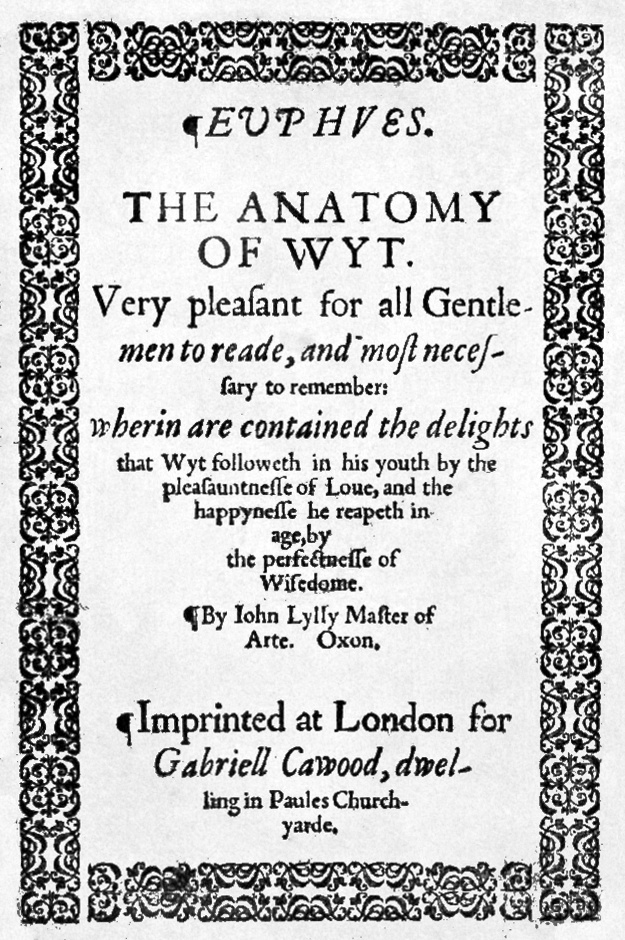|
Euphues
''Euphues: The Anatomy of Wit'' , a didactic romance written by John Lyly, was entered in the Stationers' Register 2 December 1578 and published that same year. It was followed by ''Euphues and his England'', registered on 25 July 1579, but not published until Spring of 1580. The name ''Euphues'' is derived from Greek ευφυής (''euphuēs'') meaning "graceful, witty." Lyly adopted the name from Roger Ascham's '' The Scholemaster'', which describes Euphues as a type of student who is "apte by goodness of witte, and appliable by readiness of will, to learning, hauving all other qualities of the mind and parts of the body, that must an other day serue learning, not troubled, mangled, and halfed, but sound, whole, full & able to do their office" (194). Lyly's mannered style is characterized by parallel arrangements and periphrases. The style of these novels gave rise to the term ''euphuism''. The proverb "All is fair in love and war" has been attributed to Lyly's ''Euphu ... [...More Info...] [...Related Items...] OR: [Wikipedia] [Google] [Baidu] |
John Lyly
John Lyly (; also spelled ''Lilly'', ''Lylie'', ''Lylly''; born c. 1553/54 – buried 30 November 1606)Hunter, G. K. (2004)"Lyly, John (1554–1606)". ''Oxford Dictionary of National Biography''. Oxford University Press. Retrieved 23 January 2012. was an English writer, playwright, courtier, and parliamentarian. He first achieved success with his two books ''Euphues, Euphues: The Anatomy of Wit'' (1578) and its sequel ''Euphues and His England'' (1580), and then became a dramatist, writing eight plays which survive, at least six of which were performed before Elizabeth I, Queen Elizabeth I. Lyly's distinctive and much imitated literary style, named after the title character of his two books, is known as ''euphuism''. He is sometimes grouped with other professional dramatists of the 1580s and 1590s like Christopher Marlowe, Robert Greene (dramatist), Robert Greene, Thomas Nashe, George Peele, and Thomas Lodge, as one of the so-called University Wits. He has been credited by some ... [...More Info...] [...Related Items...] OR: [Wikipedia] [Google] [Baidu] |
Euphuism
Euphuism is an elegant literary style that was briefly in fashion during the Elizabethan era. The euphuism style employed the frequent use of alliteration, antithesis, balance, and simile, with references to nature and mythological tales. Euphuism was fashionable in the 1580s, especially in the Elizabethan court. Its origins can be traced back to Spanish writer Antonio de Guevara, whose ornate, manierist courtesan prose became very popular throughout Europe, and whose work ''The Clock of the Princes'', translated into English in 1557 by Thomas North, reached its peak in popularity during Elizabeth I's reign. ''Euphues'' (1580) "Euphues" (εὐφυής) is the Greek for "graceful, witty". John Lyly published the works '' Euphues: The Anatomy of Wit'' (1578) and ''Euphues and his England'' (1580). Both works illustrated the intellectual fashions and favourite themes of Renaissance society— in a highly artificial and mannered style. The plots are unimportant, existin ... [...More Info...] [...Related Items...] OR: [Wikipedia] [Google] [Baidu] |
Thomas Lodge
Thomas Lodge (September 1625) was an English writer and medical practitioner whose life spanned the Elizabethan and Jacobean periods. Biography Early life Thomas Lodge was born about 1557 in West Ham, the second son of Sir Thomas Lodge, Lord Mayor of London, by his third wife Anne (1528–1579), daughter of Henry Luddington (died 1531), a London grocer. The year before he was born his father had transferred the ownership the manors of Hawkstone and Soulton to Sir Rowland Hill, publisher of the Geneva Bible and a fellow Lord Mayor. The Lodge family continued some form of association with those manors, and it has been suggested that this was part of the inspiration of Lodge junior's literary output. He was educated at Merchant Taylors' School and Trinity College, Oxford; taking his BA in 1577 and MA in 1581. In 1578 he entered Lincoln's Inn, where, as in the other Inns of Court, a love of letters and a crop of debts were common. Early literary work Lodge, dis ... [...More Info...] [...Related Items...] OR: [Wikipedia] [Google] [Baidu] |
Roger Ascham
Roger Ascham (; 30 December 1568)"Ascham, Roger" in '' The New Encyclopædia Britannica''. Chicago: Encyclopædia Britannica Inc., 15th edn., 1992, Vol. 1, p. 617. was an English scholar and didactic writer, famous for his prose style, his promotion of the vernacular, and his theories of education. He served in the administrations of Edward VI, Mary I, and Elizabeth I, having earlier acted as Elizabeth's tutor in Greek and Latin between 1548 and 1550. Early life Ascham was born at Kirby Wiske, a village in the North Riding of Yorkshire, near Northallerton, the third son of John Ascham, steward to Baron Scrope of Bolton. The name Ascham is derived from Askham near York."Ascham, Roger" in ''Oxford Dictionary of National Biography''. 1st edn. 2004. His mother, Margaret, is said to have come from the Conyers family, but this is speculation. Thomas and John were Roger's two elder brothers, while Anthony Ascham was the youngest son of the Ascham family. The authority for this ... [...More Info...] [...Related Items...] OR: [Wikipedia] [Google] [Baidu] |


